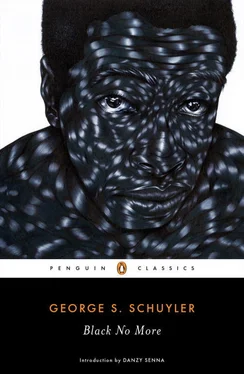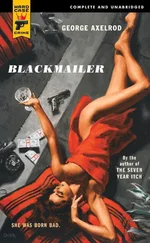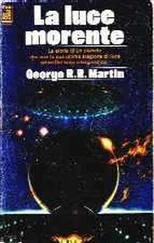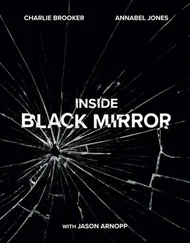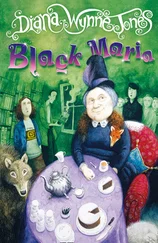—
In the years that followed the publication of Black No More , Schuyler’s healthy skepticism toward authority and his absurdist, freewheeling humor gave way to rigidity and humorless Far Right extremism. In the end he did join a club, the John Birch Society, and became the kind of tool of the Far Right that he might have brilliantly parodied in his earlier work. The statements he made later in life against the civil rights movement and in particular against Martin Luther King Jr. would taint his public image and allow him to be dismissed as a serious thinker.
The turn against Schuyler can be glimpsed in the 1971 edition of Black No More , in the introduction by Charles Larson, a prominent scholar of African and African American literature. In a scolding, censorious tone, Larson makes it clear how much he dislikes both the novel and its author:
Black No More is disturbing in these days of renewed Black Pride and Black Power. There is no pride in being black and certainly little indication that the black person in America has anything culturally his own worth holding on to…. It is a plea for assimilation, for mediocrity, for reduplication, for faith in the (white) American dream…. Hardly a page passes by without some aspect of black American life being satirized or attacked…. Schuyler’s bitterness is clearly apparent.
Reducing Black No More to the mildly amusing but ultimately unimportant scribblings of a black reactionary, Larson turns a blind eye to all the ways the novel was and remains a liberating and lacerating critique of American racial madness, capitalism, and white superiority.
Rereading Black No More so many years later, in the era of Trump and Rachel Dolezal, Beyoncé’s “Formation” and that radical Pepsi commercial starring Kendall Jenner, of the rise and fall of Tiger Woods’s land of Cablinasia, and of Michael Jackson’s “race lift” and subsequent death, Schuyler’s wild, misanthropic, take-no-prisoners satire of American life seems more relevant than ever.
Schuyler belongs to the pantheon of black writers in America who have seen their work either reviled, forgotten, dismissed, or—most commonly—ignored in their own lifetime. In this respect, he belongs in the company of Chester Himes, Fran Ross, William Melvin Kelley, Zora Neale Hurston, and Nella Larsen, most of whom died in poverty or saw their work go out of print, and whose work was appreciated only after they were gone—and in some cases, not yet.
There is no stable ground to stand on in Black No More . Its irony and merciless satire steadfastly resist the anthropological gaze of the reader. It is a novel in whiteface. And while black literature is almost always read as either autobiography or sociology, Schuyler’s work can be read as neither. It is one of the earliest examples of black speculative fiction. Black No More resists the push toward preaching and the urge toward looking backward into history. Afrofuturist before such a term existed, it insists, instead, on peering forward into what could come to be.
—
My father taught me how to laugh about race. And now that I am a parent myself, I understand what he was after in his Schuyleresque satires. I find myself trying to transmit—mostly unconsciously—the same lessons to my sons. I am trying to teach them to make a mockery of the world they’ve been handed—to find a way to twist it and spin it and flip it upside down so even the most painful experiences become material for their own private jokes. I am trying to show them they can wear two faces. They must wear two faces.
Black No More is funny, but it is also horrific. Humor gives way to horror and then veers back again.
Now is the time to read Schuyler’s novel. Now more than ever we need literature that is as fearless, observant, and obstinate as Black No More , that speaks the uncomfortable and unpopular truths. Now more than ever we need work that is not afraid of its own contradictions. Through Schuyler, I am reminded—even for just the length of this short, cutting, wild ride of a novel—of what it looks like to be free.
DANZY SENNA
Over twenty years ago a gentleman in Asbury Park, N. J. began manufacturing and advertising a preparation for the immediate and unfailing straightening of the most stubborn Negro hair. This preparation was called Kink-No-More, a name not wholly accurate since users of it were forced to renew the treatment every fortnight.
During the intervening years many chemists, professional and amateur, have been seeking the means of making the downtrodden Aframerican resemble as closely as possible his white fellow citizen. The temporarily effective preparations placed on the market have so far proved exceedingly profitable to manufacturers, advertising agencies, Negro newspapers and beauty culturists, while millions of users have registered great satisfaction at the opportunity to rid themselves of kinky hair and grow several shades lighter in color, if only for a brief time. With America’s constant reiteration of the superiority of whiteness, the avid search on the part of the black masses for some key to chromatic perfection is easily understood. Now it would seem that science is on the verge of satisfying them.
Dr. Yusaburo Noguchi, head of the Noguchi Hospital in Beppu, Japan, told American newspaper reporters in October 1929, that as a result of fifteen years of painstaking research and experiment he was able to change a Negro into a white man. While he admitted that this racial metamorphosis could not be effected overnight, he maintained that “Given time, I could change the Japanese into a race of tall blue-eyed blonds.” The racial transformation, he asserted, could be brought about by glandular control and electrical nutrition.
Even more positive is the statement of Mr. Bela Cati, an electrical engineer residing in New York City, who, in a letter dated August 18, 1930, and addressed to the National Association for the Advancement of Colored People, said, in part:
Once I myself was very strongly tanned by the sun and a European rural population thought that I was a Negro, too. I did not suffer much but the situation was disagreeable. Since that time I have studied the problem and I am convinced that the surplus of the pigment could be removed. In case you are interested and believe that with the aid of your physicians we could carry out the necessary experiments, I am willing to send you the patent specification … and my general terms relating to this invention…. The expenses are so to say negligible.
I wish to express my sincere thanks and appreciation to Mr. V. F. Calverton for his keen interest and friendly encouragement and to my wife, Josephine Schuyler, whose coöperation and criticism were of great help in completing Black No More.
GEORGE S. SCHUYLER
New York City, September 1, 1930
Max Disher stood outside the Honky Tonk Club puffing a panatela and watching the crowds of white and black folk entering the cabaret. Max was tall, dapper and smooth coffee-brown. His negroid features had a slightly satanic cast and there was an insolent nonchalance about his carriage. He wore his hat rakishly and faultless evening clothes underneath his raccoon coat. He was young, he wasn’t broke, but he was damnably blue. It was New Year’s Eve, 1933, but there was no spirit of gaiety and gladness in his heart. How could he share the hilarity of the crowd when he had no girl? He and Minnie, his high “yallah” flapper, had quarreled that day and everything was over between them.
“Women are mighty funny,” he mused to himself, “especially yallah women. You could give them the moon and they wouldn’t appreciate it.” That was probably the trouble; he’d given Minnie too much. It didn’t pay to spend too much on them. As soon as he’d bought her a new outfit and paid the rent on a three-room apartment, she’d grown uppity. Stuck on her color, that’s what was the matter with her! He took the cigar out of his mouth and spat disgustedly.
Читать дальше
